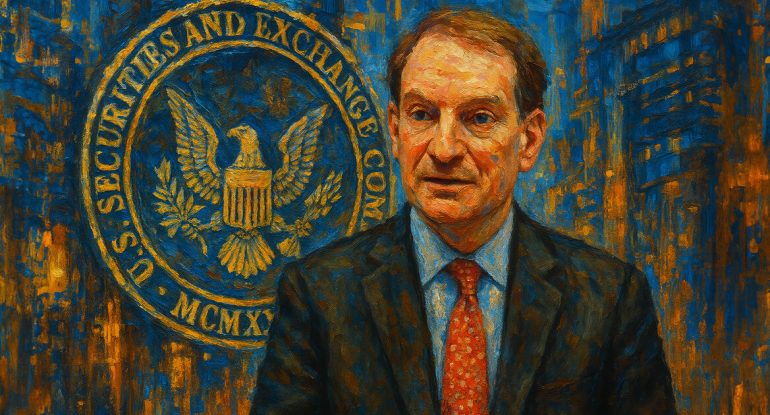SEC Chair Confirmed: Atkins Succeeds Gensler

In a move that signals a shift in regulatory approach, the United States Senate confirmed Paul Atkins as the new Chair of the Securities and Exchange Commission (SEC) on April 9, with a vote of 52-44.
This decision, which saw support solely from Senate Republicans, is widely viewed as the beginning of a move away from the more aggressive, enforcement-focused regulatory style championed by the previous Chair, Gary Gensler.
Paul Atkins, a familiar face at the SEC as a former Commissioner, and a seasoned consultant from Wall Street, is now stepping into a key role to potentially reshape how the agency interacts with the rapidly evolving world of digital assets.
Background and confirmation
Earlier in April, Atkins’ nomination successfully passed through the Senate Banking Committee, setting the stage for his confirmation. Once officially sworn in, he will take over from Acting Chair Mark Uyeda, who has been leading the Commission since Gensler’s departure in January, and will serve out the remainder of the current term, which extends until June 2026.
Even in his brief time as Acting Chair, Uyeda had already begun to implement some deregulatory measures. This included dismissing several ongoing enforcement cases related to crypto and reversing SAB 121, an internal rule that had placed restrictions on crypto custody for public companies.
Atkins brings a wealth of experience to the role. He previously served as an SEC Commissioner from 2002 to 2008. More recently, he has been at the helm of Patomak Global Partners, a consultancy firm providing guidance to financial and digital asset companies on navigating compliance and risk.
Adding to his crypto background, Atkins also headed the Token Alliance, a group advocating for the crypto industry. Public ethics disclosures reveal that Atkins and his spouse have investments in crypto-related assets valued at up to $6 million.
Regulatory orientation and philosophical differences
Atkins’ confirmation strongly suggests a change in direction from the philosophical stance adopted during Gensler’s tenure. Gensler’s time was marked by over 100 enforcement actions targeting the crypto space, often portraying it as speculative and lacking compliance. In contrast, Atkins has been a vocal proponent of establishing a clear regulatory framework that fosters digital asset innovation while still protecting investors through principles-based regulation.
During his confirmation hearing, Atkins stressed the importance of creating a sensible and well-defined framework for digital assets. He indicated his intention to work collaboratively with the CFTC and Congress to address ambiguities in jurisdiction and regulation. His approach aligns with the broader goals of the Trump administration to position the United States as a leading global center for Bitcoin and finance powered by blockchain technology.
Gensler, on the other hand, maintained that most digital tokens fell under existing securities laws, prioritizing an enforcement-first approach. While he did acknowledge Bitcoin was not a security and approved Bitcoin futures ETFs, he remained generally wary of the wider crypto ecosystem, expressing concerns that many projects seemed more like risky ventures than sustainable, reliable products.
Crypto policy trajectory
Atkins is taking over a Commission that is already in a state of transition. Under Uyeda’s acting leadership, the SEC had already started to ease its regulatory pressure on the digital asset industry. Significantly, internal guidance was reportedly issued to exclude certain categories of crypto assets from being classified as securities, and a dedicated internal task force was created to engage directly with stakeholders in the industry.
These initial steps offer a preview of the direction many expect Atkins to take. The crypto community is anticipating swift action to formalize policy changes, speed up the approval process for ETFs, and establish clear distinctions between decentralized and centralized digital assets. This leadership change is seen as a potentially pivotal moment, one that could fundamentally reshape how capital markets interact with tokenized instruments.
Discussions are already underway regarding proposals to create safe harbor provisions for decentralized protocols and simplify the pathways to compliance. Several pending applications for ETFs based on tokens like XRP and Solana, which had previously stalled, may now find a more favorable reception.
Broader implications
Atkins’ deregulatory philosophy extends beyond just crypto markets and into traditional finance as well. He has publicly supported reducing the burden of disclosures and simplifying the rules around capital formation for private companies.
During his confirmation process, he signaled an openness to reconsidering the current definitions of accredited investors, suggesting that financial understanding and experience, rather than just net worth, should be the determining factor for access to private markets.
Tim Scott, Chair of the Senate Banking Committee, stated that Atkins’ appointment would bring “regulatory clarity for digital assets.” Acting Chair Uyeda, along with two fellow Commissioners, also issued a statement welcoming Atkins back to the agency. However, not all reactions were positive. Senator Elizabeth Warren, as reported by The Wall Street Journal, voiced criticism of his ties to Wall Street and specifically pointed to his advisory role with FTX as a reason why he should be disqualified.
The SEC, already facing staff reductions as part of broader federal downsizing, is now under added pressure to adjust its regulatory approach. Atkins will have the complex task of maintaining institutional stability while simultaneously implementing an agenda that aims to redefine crypto oversight, restructure enforcement priorities, and possibly reopen the conversation around self-regulatory organizations for digital markets.











